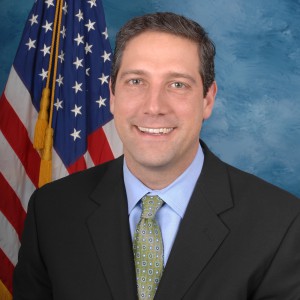Washington, D.C., May 23 – Ohio Rep. Tim Ryan took office in 2003, but he gained notoriety in 2016 when he challenged then-Minority Leader Nancy Pelosi, saying that a new generation of leadership was needed in the Democratic Party. Now, Rep. Ryan is running for President. When examining his record on disability issues, it is clear that Rep. Ryan advocates for mental health awareness and has supported the disability community by cosponsoring several important bills.
In recent years, he has cosponsored two bills on mental health issues that have become law. The National Suicide Hotline Improvement Act of 2018 aims to shorten the suicide hotline phone number to three digits to make it easier to call. The Law Enforcement Mental Health and Wellness Act of 2017 makes grants available to initiate peer mentoring pilot programs, helps develop resources for mental health providers on the specific challenges that law enforcement officers face, and will examine the effectiveness of crisis hotlines and annual mental health checks.
In the above video, Rep. Ryan discussed the issue of veterans dying by suicide. “22 [veterans] a day take their own lives,” he said. “That’s a failed system.” He is a co-chair of the Military Mental Health Caucus and has introduced legislation aimed at addressing this problem.
Rep. Ryan is a cosponsor on several pending pieces of legislation that would directly impact people with disabilities. One example is the Disability Integration Act of 2019, which would require private health insurance to cover long-term care, such as in-home nursing care and personal care attendants for people with disabilities. Many people with disabilities require assistance with activities of daily living such as showering, toileting and dressing. Long-term care coverage permits them to live independently in their own communities. While the Senate version of the bill struggles to gain bipartisan support, the House version is gaining increasing bipartisan support.
Another example is the Transformation to Competitive Employment Act. According to ANCOR, “This landmark legislation aims to dramatically increase competitive, integrated employment for people with disabilities by providing large grants and extensive technical assistance to both states and individual providers. Additionally, the bill ensures that workers with disabilities, in integrated and non-integrated settings, are paid at least minimum wage by gradually phasing out the 14c subminimum wage program over six years.”
Campaign Launch Has Mixed Results on Disability Inclusion

For a presidential campaign to be fully inclusive of people with disabilities, it needs to meet the following requirements: (1) offer captioning with every video it shares or produces, (2) mention people with disabilities and their issues, (3) depict people with visible disabilities in its media, (4) reach out to the disability community, and (5) provide accessible campaign events and website. Rep. Ryan has met some of these requirements, but there is much room for improvement.
Most of his videos have captions of some form, but there are exceptions, like this video from Fox News. The videos produced by the campaign have accurate open captions. But too many videos on his YouTube page rely on YouTube’s automatic captioning, which often contains errors. These captions can be fixed for free but that has not always been done on his videos. Without accurate captions on all video content, people who are deaf or hard of hearing are being left out of the campaign. Additionally, photos on his website do not have alt-text, and photos on his Facebook page rely on automatically generated alt-text, which is not descriptive enough. This means that Ryan’s message is not accessible to people who use screen readers.
When analyzing polls, it is integral to identify the participants’ demographics and determine where the candidate stands with swing voters. One important group of swing voters are people with disabilities, who comprise 20 percent of our country’s population. And more than half of Americans have a loved one with a disability. A recent survey shows that fully three-quarters of likely voters either have a disability themselves or have a family member or a close friend with disabilities. Thus, if Rep. Ryan hopes to climb in the polls, he must represent all Americans, especially those with disabilities.
Voter research conducted by RespectAbility shows how disability issues connect to all aspects of American life. It is in the best interest of every presidential candidate and the citizens of this country for candidates to recognize disability issues during their campaigns.
“Candidates for office ignore the disability community at their peril,” said former U.S. Representative and Dallas Mayor Steve Bartlett. Bartlett, who was a primary author of the Americans With Disabilities Act of 1990, is the board chair of RespectAbility. “People with disabilities are politically active swing voters, and candidates should take note of the important issues they care about.”
Be First to Comment